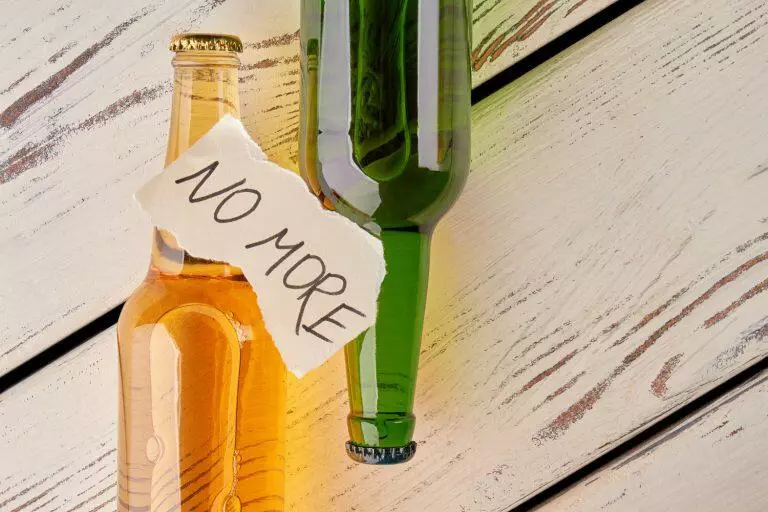Choosing to stop drinking is an incredibly courageous step, especially considering the prevalence of alcohol use worldwide. Alcohol is the second most used drug after caffeine, and the 2021 National Survey on Drug Use and Health (NSDUH) reported that 29.5 million individuals aged 12 and above struggle with alcohol use disorder (AUD).
This widespread consumption is largely due to the normalization of alcohol in many societies – most people grow up in environments where sharing bottles of wine or six-packs of beer is commonplace. A Gallup report highlights that approximately 60% of the US population consumes alcohol regularly. This high level of use and easy availability can make quitting alcohol extremely challenging.
However, the medical community is in agreement: stopping drinking can have a significant impact on your long-term mental and physical health. In fact, most people start to experience noticeable benefits within the first couple of weeks of quitting.
In this article, we’ll delve into what happens when you stop drinking, providing you with an alcohol quitting timeline and insights into the many benefits of sobriety.
Please note, for individuals with an alcohol addiction, alcohol withdrawal can pose serious health risks. In these cases, if you’re planning to quit drinking, it’s crucial to understand the potential risks and to seek professional medical assistance.
Different types of alcohol use
When it comes to alcohol, everyone’s experience is unique. Your health, genetic makeup, mental well-being, and lifestyle all play a role in how the drug affects you. Whether you’re someone who only drinks occasionally, or you’re grappling with a heavier dependency, the impact of alcohol can vary widely.
Below are the most common types of drinking patterns and their potential effects. Bear in mind that these are rough categories and alcohol affects everyone differently – it’s okay to seek help wherever you find yourself on this spectrum.
Social drinker
Occasional drinkers, typically only partaking at social events. They regulate their alcohol consumption and generally avoid negative consequences or any serious harm.
Moderate drinker
Consistent, controlled consumers of alcohol, often aligning with recommended daily intake guidelines. While certainly better for your health than heavy drinking, a moderate drinking habit still exposes you to potential increased cancer risk and potential for dependency.
Binge drinker

Drinkers who engage in episodes of excessive drinking over short periods, usually surpassing recommended limits. This behavior often leads to significant health and safety risks.
Heavy drinker
Regular consumers of large quantities of alcohol. They often experience physical and mental health issues, as well as potential social and legal troubles.
Alcohol dependent
Experience physical and psychological reliance on alcohol, with withdrawal symptoms when not drinking. Their alcohol consumption significantly disrupts their daily life, including work and relationships.
How much alcohol is safe to consume?
The answer to “How much alcohol is safe to consume?” varies depending on numerous factors, including a person’s health status, age, sex, and tolerance levels. According to guidelines from the US Centers for Disease Control and Prevention, moderate drinking is defined as up to 1 drink per day for women and up to 2 drinks per day for men. However, these guidelines do not suggest that these amounts are safe for everyone.
For those with a history of addiction, the safe amount of alcohol is none.
No matter the form it takes – spirits, wine, or light beer – alcohol can act as a trigger, reactivating addictive pathways in the brain and potentially leading to relapse. If you’ve battled with alcohol addiction, it’s pivotal to maintain complete abstinence. The ‘safe’ level of alcohol for people with Alcohol Use Disorder (AUD) is zero, as even a small amount could rekindle the cycle of dependency.
A timeline of what happens after quitting alcohol
The timeline for feeling better after quitting alcohol varies significantly from person to person. Whether you experience alcohol withdrawal symptoms when you stop drinking depends on your previous level and frequency of intake.
If you’re a moderate drinker, you may simply feel a longing for alcohol rather than any intense physical symptoms. However, if you’re used to drinking a lot, stopping abruptly could lead to a range of mental and physical withdrawal symptoms.
Ultimately, the severity of alcohol withdrawal depends upon numerous factors, such as overall health status, duration and severity of alcohol use, genetic predispositions, the presence of any co-existing mental or physical health conditions, and the level of support available during recovery.
That being said, social or moderate drinkers are unlikely to experience any severe withdrawal symptoms. The timeline below specifically refers to those with alcohol dependency, and is a rough outline of what happens after their last drink:
- First 2–12 hours: Initial withdrawal symptoms may include shaky hands, retching, excessive sweating, restlessness, and anxiety.
- 12–24 hours: Withdrawal symptoms continue, accompanied by alcohol cravings, reduced energy, feelings of depression, and sleep disturbances.
- 12–72 hours: This period can bring severe withdrawal symptoms such as dangerously high heart rate, increased blood pressure, and seizures.
- 48–72 hours: For many, withdrawal symptoms ease or start to become manageable.
- 3–7 days: Withdrawal symptoms usually cease for most. In a few cases, they may worsen into a medical emergency known as delirium tremens (DTs), which requires medical supervision.
- 1 week: After a week without alcohol, you may notice an improvement in your sleep.
- 1–2 weeks: Clinical alcohol detox period typically concludes.
- 2 weeks: Possible weight loss due to the absence of alcohol calories and signs of liver recovery.
- 3–4 weeks: Blood pressure (formerly elevated by alcohol) should begin to reduce to healthier levels.
- 1 month: Skin condition may improve.
- 3 months: Increased energy and a general feeling of better health.
- 1 year: Few may experience prolonged withdrawal symptoms such as low energy, anxiety, sleeping issues, or alcohol cravings. However, by the end of the first year, most will enjoy the immense benefits of being alcohol-free.
The importance of tapering off alcohol

If you are a heavy drinker or alcohol dependent, quitting cold turkey can lead to severe withdrawal symptoms such as seizures or delirium tremens. These can be life-threatening, so it’s essential you seek professional guidance.
By slowly reducing your alcohol intake with the help of a healthcare professional, these potential risks can be managed safely. This process is typically part of a larger alcohol treatment program; one designed to help you transition comfortably and safely through withdrawal stages.
In some cases, you may be prescribed certain medications to help you through the withdrawal process. Benzodiazepines (such as chlordiazepoxide and diazepam) are often used to manage the acute symptoms of alcohol withdrawal, while anticonvulsants can help to prevent seizures during severe alcohol withdrawal. The choice of medication will depend on your circumstances and should always be taken under professional supervision.
Can the health impacts of heavy drinking be reversed?
Many health impacts of heavy drinking can indeed be reversed, or at least significantly improved, once you stop consuming alcohol. While alcohol abuse can have a severe impact on your body (especially your liver), as soon as you’ve had your last drink your body will begin to heal.
Your liver, a major victim of heavy drinking, can start to regenerate cells and repair itself once alcohol consumption ceases, as long as the damage isn’t too severe.
According to a systematic review conducted in 2021, abstaining from alcohol for a span of two to four weeks led to notable reductions in inflammation and high liver serum levels among heavy drinkers.
It’s essential to keep in mind that the extent to which health issues can be reversed depends on several factors, such as your level of alcohol dependence, the degree of damage, and your unique health situation.
What are the health benefits of stopping drinking?

People often ask, “What happens when I stop drinking for a month?”
While giving up alcohol for any length of time is a brave step, we believe this isn’t the best question to ask. The goal for those negatively impacted by their alcohol use should be long-term, sustainable abstinence.
That being said, people do experience many health benefits within the first month of quitting.
Firstly, you may notice improvements in your sleep quality and skin condition. Given reduced calorie intake, you’ll also likely experience some weight loss. Most importantly, even a short break from alcohol can give your liver a chance to recover from any minor alcohol-induced damage.
You might also see a marked improvement in your cognitive functioning, as heavy drinking can interfere with brain development and impair memory.
Many of these short-term benefits carry over into the long term. After the initial challenges of alcohol withdrawal, your body, mind, and overall health will begin to flourish. Below are some of the long-term benefits of quitting alcohol:
Improved liver health
When you stop drinking, your body’s liver can begin to detox from alcohol, reducing the risk of liver disease and improving overall liver function.
Reduced risk of cancer
Consuming alcohol has been linked with several forms of cancer, including head, neck, esophageal, liver, breast, colorectal, and more. When you quit heavy drinking your risk of developing alcohol-related cancers can decrease over time.
Better heart health

Alcohol use has been linked to multiple cardiovascular issues. Stopping drinking has been shown to lower blood pressure and reduce the risk of heart disease.
Weight loss
Alcohol is high in calories. When you quit drinking, your body may undergo weight loss due to reduced calorie intake.
Improved mental health
The relationship between alcohol and mental health is complex. Heavy use can either contribute to psychiatric conditions or be a result of them. In many cases, drinking is used to temporarily ‘numb’ any unpleasant symptoms experienced due to mental health conditions. However, this is a short-term solution that can exacerbate your mental health in the long run.
If you decide to stop drinking, it’s normal for underlying symptoms to surface more intensely. This is why professional therapeutic support is crucial. It can help address and manage such symptoms effectively, providing the guidance needed for a lasting, healthier recovery.
There’s little doubt that with the right support, long-term abstinence from alcohol can lead to better mental health. This study showed abstaining from alcohol for five years significantly improved self-reported mental health status, with individuals noting positive changes in their mental well-being throughout this period.
Enhanced cognition
Excessive alcohol intake can lead to a reduction in the size of the hippocampus, a brain region crucial for memory and learning. A period of abstinence from alcohol, ranging from several months to a year, may help in partially reversing these structural changes in the brain.
Ceasing alcohol consumption can also contribute to the reversal of adverse effects on cognitive abilities, including problem-solving, memory, and attention.
Better sleep
Alcohol consumption can disrupt sleep by interfering with the natural sleep-wake cycle, leading to poorer quality sleep and daytime fatigue. Without the disruptive effects of alcohol, your body’s sleep patterns can improve, leading to more restful sleep and increased energy levels.
Improved skin health

Chronic and heavy alcohol consumption can result in multiple skin issues such as redness, loss of elasticity, and excessive dryness. Quitting alcohol can improve your skin health as hydration levels in your body improve, resulting in clearer, healthier skin.
Stronger immune system
Healthcare professionals have long noted a correlation between high alcohol intake and negative impacts on immune-related health outcomes. When you stop drinking, your immune system can recover and better protect your body from serious infections and viruses, making you healthier overall.
How Maui Recovery can help
Firstly, if you’ve taken the courageous step to quit drinking alcohol, we commend you. You’ve begun to pave the way to a healthier, more rewarding life. As we’ve discussed, the journey from alcohol dependence to recovery involves various stages, each presenting its own unique challenges and rewards.
From the onset of withdrawal symptoms to the long-term physical and psychological benefits, the transition from a life centered around drinking can be genuinely transformative.
At Maui Recovery, we understand that your decision to stop drinking alcohol is unique to you. That’s why we provide personalized programs that employ some of the best treatments for alcohol addiction, such as CBT, group therapy, and mindfulness-based stress reduction (MBSR) – tailored to meet your individual needs.
Our expert team is fully committed to providing you with the necessary support and tools needed to help you through this transition.
Remember, firmly saying “no” to that proffered drink isn’t just about removing a harmful substance from your life – it’s about making room for improved health, better relationships, and a renewed sense of self.
For more information on Alcohol Use Disorder, read our article on the signs and symptoms of alcohol addiction. If you’d like to talk to us about this subject, our addiction treatment programs, or how we can help, please don’t hesitate to contact us.









